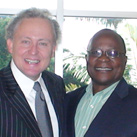Knocking On Death’s Door For Christ: Philippians Series #15

Throughout the book of Philippians, as well as other New Testament books, Paul wrote, constantly thinking about others. Paul has devoted himself to the Lord Jesus Christ and the development of deep friendships.
 Have you noticed when you read the writings of the Apostle Paul, how many friends he has? Paul not only knew how to win souls, but he knew how to win friends. For example, in Romans 16 there are at least 35 names of people who were friends of Paul.
Have you noticed when you read the writings of the Apostle Paul, how many friends he has? Paul not only knew how to win souls, but he knew how to win friends. For example, in Romans 16 there are at least 35 names of people who were friends of Paul.
In this chapter, we will study another one of those friends. His name is Epaphroditus. You probably wouldn’t name one of your sons Epaphroditus, but the name means lovely, charming, or handsome. He is one of those beautiful pictures, in the Bible, of a consecrated lay person who has given himself totally, unreservedly to the service of the Lord Jesus Christ. He is immortalized in the pages of scriptures because he is willing to lay it all on the line for the Lord Jesus Christ.
Epaphroditus is one of those selfless Christians who don’t have to be the quarterback on the team. He doesn’t have to be a big fish in a little pond. Epaphroditus is willing to take the place which God has given to him and serve the Lord in that role in unselfish service. When I read Epaphroditus’ story, I think of fellow servants I know throughout the Body of Christ, who have given their all to fulfill God’s will for their lives.
What does it mean to lay on the line for Christ? What does it look like when a Christian goes the extra mile, beyond the normal call of duty?
I. We Are To Be Stable Christians
 I write to explain Epaphroditus’ life in order to show us what we should be.
I write to explain Epaphroditus’ life in order to show us what we should be.
In Philippians 2:25, we read, “But I thought it necessary to send to you Epaphroditus, my brother and fellow worker and fellow soldier, who is also your messenger and minister to my need.” Then, Paul gives us three statements, “My brother and companion in labor, and fellow soldier.” What we have is a picture of a balanced Christian.
Sometimes there is a tendency for Christians and for churches to get out of balance or become unstable. Some churches become like a wobbly tire because they go to extremes in certain directions. There are some Christians who are out of balance, and they have not learned the beautiful balance that God wants us to have in our lives as believers. How does a stable Christian live?
In Philippians chapter one, there are three phrases that I focused on earlier in this book. In verse 5, he talks about your fellowship in the gospel. Then in verse 12, he talks about the furtherance of the gospel. Then in verse 27, he talks about striving together for the faith of the gospel.
Those three phrases identify the balance that Christ intends us to have as believers. Your fellowship in the gospel, that is, sharing the things of the Lord Jesus Christ together. The furtherance of the gospel means winning other people to faith in the Lord Jesus Christ, wanting to further the gospel of Christ. Then, there is the striving together for the faith of the gospel, that is, standing for the faith of the Lord like a good soldier.
There is a tendency sometimes to get those three areas out of balance in our Christian life. If you are not very careful, you can become interested in the fellowship of the gospel and you can enjoy other believers and saints of the Lord so that this becomes the total circumference of your ministry in your life.
Or if you are not careful you get so interested in the furtherance of the gospel and winning people to faith in Christ that you do not grow and develop in discipleship and become the kind of Christian God wants you to become.
Or if you are not careful, you can get so involved in fighting for the faith that you become a theological fighter. You can so earnestly contend for the faith that you become contentious. We are not to become a gospel sheriff.
Epaphroditus is a balanced and stable Christian. In Philippians 2:25, we read, “Epaphroditus, my brother.” That means that he is sharing the fellowship of the gospel. He has talked about Timothy in the previous verses, who is Paul’s son in the faith. Now he is talking about Epaphroditus, who is a brother in the faith. Think about this picture. It means that Paul, Timothy, and Epaphroditus are in the same family. They share the same Savior. They have been saved by the same grace. What a wonderful thing it is to be a part of the family of God.
Not only will you notice that he is a brother, that is, he is sharing the fellowship of the gospel, but he also says that he was “my companion in labor.” There can be no doubt he was involved in seeking the furtherance of the gospel. That seems to say to me that he is a soul winner and a witness for the Lord. As wonderful as the fellowship of the gospel is and as much as we enjoy the people of God, we have to be careful that you do not develop an ingrown attitude in your Christian life.
It says that Epaphroditus is also a fellow soldier. We are in a battle. The Christian life is not a playground but a battleground. The Bible says that we are to endure hardness as good soldiers of Jesus Christ. The Bible challenges us to fight the good fight of faith. It is time for God’s people to take their stand for the faith. It is time for God’s people to get on the front lines of the battle for God and for truth and morality and decency in their nation.
II. We Are To Be Sacrificial Christians
 We learn that not only is Epaphroditus a stable Christian, but he is a sacrificial Christian. We read in Philippians 2:26, “because he was longing for you all and was distressed because you had heard that he was sick.” We know that the book of Philippians is a book of Christian joy in the Lord. We may be a little bit surprised to find in a book of joy that he uses some words such as heaviness. Later we read “sorrow upon sorrow.” Again, you will notice that he uses the word “sorrowful.”
We learn that not only is Epaphroditus a stable Christian, but he is a sacrificial Christian. We read in Philippians 2:26, “because he was longing for you all and was distressed because you had heard that he was sick.” We know that the book of Philippians is a book of Christian joy in the Lord. We may be a little bit surprised to find in a book of joy that he uses some words such as heaviness. Later we read “sorrow upon sorrow.” Again, you will notice that he uses the word “sorrowful.”
Sometimes the highway of happiness leads us through the valley of sorrow. Paul says that he was full of heaviness for them. What made this man, Epaphroditus, so full of heaviness?
The words “full of heaviness” carry the idea of mental and emotional anguish. It’s the same word that was used of Jesus in the Garden of Gethsemane. It’s a picture that means not at home, a sense of estrangement. The Bible says that in the Garden of Gethsemane, our Lord Jesus Christ was very sorrowful. Epaphroditus was filled with mental and emotional anguish. He had his Gethsemane.
Sooner or later most Christians have their own Gethsemane. Are you walking through your Gethsemane? Are you fighting emotional and mental anguish? There are times of happiness and then there are times of heaviness. Sometimes in our churches today we focus so much on the joyful element of it, but we forget that there is also a sorrowful element. The Bible says in the book of Ecclesiastes that there is a time to laugh.
There is a time to laugh. But that same verse in Ecclesiastes says that there is a time to weep. The worldliness of the average congregation today is a source of sorrow. It should cause us to weep. The lack of commitment that we find on the part of many of God’s people who own a religion of convenience should cause us to weep. When I look at my own heart and my own failings before the Lord, it should cause me to weep. There is a time for heaviness in the house of the Lord.
We find the reason in these verses why Epaphroditus was full of heaviness. Paul says that he was sick. In Philippians 2:26 we read, “because he was longing for you all and was distressed because you had heard that he was sick.” In the next verse, Paul says, “For indeed he was sick to the point of death, but God had mercy on him, and not only on him but also on me, so that I would not have sorrow upon sorrow.”
In Philippians 4:18, we learn why Epaphroditus was in Rome in the first place. It says, “But I have received everything in full and have an abundance; I am amply supplied, having received from Epaphroditus what you have sent, a fragrant aroma, an acceptable sacrifice, pleasing to God.”
Evidently, Epaphroditus was a layman in the Philippian church. This church sent a gift to Paul through this man, Epaphroditus. He stayed for a period of time to minister to the needs of Paul. While he was there, the Bible says that he became sick.
Why was he sick? Here is a man who is right in the middle of faithful service. He is totally committed, sold out for the Lord Jesus Christ, and had a time of sickness. Sickness comes for many reasons to God’s people.
Dissipation
Sometimes sickness is because of dissipation. Sometimes people are sick because they overeat. Sometimes people are sick because they abuse their body. People are sick because they do not get enough rest. Sometimes we get sick because of our dissipation.
Discipline
At other times we get sick because of discipline. Maybe God is doing a work in our life. Maybe God is dealing with something in our life that needs to be dealt with, and He permits a time of sickness in our life. But sometimes sickness comes because God is trying to develop us, and sickness is one of the tools that God is using.
 Some of you are going through sickness and through testing today. God honors us by the size of the test He gives to us. Think about Lot and Abraham in the Old Testament. Lot pitched his tent toward Sodom, and the temptation of Sodom was enough to get him.
Some of you are going through sickness and through testing today. God honors us by the size of the test He gives to us. Think about Lot and Abraham in the Old Testament. Lot pitched his tent toward Sodom, and the temptation of Sodom was enough to get him.
Here was Abraham, and God tested him by having him put his son, Isaac, on the altar. There are little tests for little faith and big tests for big faith. If God had tried to test Lot like He gave to Abraham, it would be like trying to shoot mosquitoes with atom bombs. God may be giving you a big test today.
This Christian is burdened for Paul. In fact, Paul says that God was gracious to him. It says in verse 27, “God had mercy on him; and not on him only, but on me also.”
Epaphroditus is a burden for the church. Notice what he says. It is very interesting. He says in verse 26, “For he longed after you all,” talking about the church in Philippi, “and was full of heaviness, because you had heard that he had been sick.” What burdened Epaphroditus was not so much that he was sick, but that they were burdened because they had heard he was sick. Do you see how unselfish that is?
Most of the time when we get sick, we get all caught up in ourselves. Not this man Epaphroditus. In fact, some believers seem to enjoy bad health. There are some people that you had better not ask how they are feeling because they will give you a full organ recital. “My hip is bothering me. My neck is bothering me.”
Did you hear about the old timers who were sitting having coffee one morning? One of them said, “My arms are so sore I can’t even pick up my cup of coffee.” The other one said, “I’ll tell you my eyes are so bad I can’t even see my cup of coffee.” The third one said, “My neck is so stiff I can’t even bend over to drink my cup of coffee.” The other one said, “What did you say? Speak up. I can’t hear what you are saying.” The other one said, “Well, we all should thank God that at least we can still drive.”
Epaphroditus was concerned for his church. Do you love your church? Are you faithful to your local church? It seems to me at times, with the rise of Internet streaming, we are raising a generation of pajama Christians, who rarely get up and get dressed and go to the local church. If you love your local church, you will want to attend and fellowship with your brothers and sisters.
He’s concerned for Paul. He’s concerned for his church. He’s concerned for missions. This is a man who was a lay person in his church; and evidently, he lays his job down and he takes this gift, which the believers in Philippi have sent to the Apostle Paul. He gets personally involved in missions.
Every time you give, you have a part in missions. We pray for missions. However, maybe you should consider that God would have you to lay down what you are doing for a few years and to get out there on the mission field and tell a lost world about the Lord Jesus Christ.
He is also burdened for the lost. In verse 27, we read, he was nigh unto death. Then look at verse 30: “Because, for the work of Christ, he was nigh unto death.” It literally means that he was next door to death.
Paul says, “Not regarding his life.” Rome at this time frame was the common sink of all of the worst vices of the Empire. The dregs and the depths of human depravity could be found in the slums of Rome.
In that day, there was a special group of people, called right out of the Greek text, the Parabolini, “the gamblers.” They would go down into the slums of Rome and they would minister to the sick. They would bury the dead and would do it at great risk to their personal health. The literal word there means to toss the dice. It is a picture of people who are willing to literally gamble their life to be a witness for the Lord Jesus.
When we think of Christian leaders, like Epaphroditus, I think about Acts 15:26. We read, “men who have risked their lives for the name of our Lord Jesus Christ.” In Romans 16:4, we read, “who risked their own necks for my life, to whom not only do I give thanks, but also all the churches of the Gentiles.” They put their necks on the line.
Epaphroditus has hazarded his life for the gospel and for the Apostle Paul. We are living in a day of convenience. People want church to be convenient. They want to come when they take a notion to come. They don’t want to stay too long. They want the preacher to preach a nice encouraging sermon and make them feel good.
I made up my mind a long time ago. I’m not going to rob people of the truth of the gospel of the Lord Jesus. I’m not going to lower the standard for anyone. I’m going to keep the standard right up where God keeps the standard. I’m going to call you to total commitment to the Lord Jesus, to lay it all on the line for Jesus Christ. When you sell out for Jesus, that’s when the blessings come.
III. We Are To Be Significant Christians
 Epaphroditus is a stable and sacrificial Christian. Now, I desire for you to learn that he was a significant Christian. I made up my mind a long time ago that I didn’t want to go through life and live my life and not be a blessing to somebody. Wouldn’t it be a shame for you and me to live an entire life and never be a blessing to anyone? I often say that the last zero in 1,000,000,000 has the most value in the billion. The closer we move to the front, the more we decrease our value. If you don’t mean being the last zero, then you can add compounding value to everyone else.
Epaphroditus is a stable and sacrificial Christian. Now, I desire for you to learn that he was a significant Christian. I made up my mind a long time ago that I didn’t want to go through life and live my life and not be a blessing to somebody. Wouldn’t it be a shame for you and me to live an entire life and never be a blessing to anyone? I often say that the last zero in 1,000,000,000 has the most value in the billion. The closer we move to the front, the more we decrease our value. If you don’t mean being the last zero, then you can add compounding value to everyone else.
This Christian servant is a blessed Christian. He is a blessing to Paul. What a blessing he was to him! He has brought this gift. He has stayed there in Rome and has ministered for a time. I cannot thank the Lord enough for valuable friendships.
Also, Epaphroditus was significant to the believers in Philippi. Paul said, “I’m going to send him back to you.” In Philippians 2:28, it says, “Therefore I have sent him all the more eagerly, so that when you see him again you may rejoice and I may be less concerned about you.”
Are you reading this carefully? When people see you coming, do they rejoice? “Oh, my gracious, here comes Mr. Gripe. Oh no, here comes Sister Bellyacher. I cannot believe it, here comes critic Charlie, sarcastic Sally and negative Norman.” Do you light up a room or make it darker when you arrive? Are people refreshed or worn-out?
No doubt, the Philippian church said, “We look forward to seeing this man come back.” Let me encourage you to be a blessing to your church. He was a blessing to Paul, and he was a blessing to his church.
Epaphroditus is a blessing to me. Two thousand years after he lived, I am reading about him and renewed in my spirit and soul. I expect to see Epaphroditus in heaven one of these days. It has been my practice to thank people here on earth. I am sure that I would want to thank him in heaven!
You take a rock, drop it in the lake, and the ripples just go on and on and on. They tell me when you speak a word that that word just goes on and on and on out there in space.
Evangelist D. L. Moody was a humble leader. He was just willing to be used of God. He founded the YMCA, Moody Church, and Moody College. In my library, I pull out a book and it will say, “Moody Press.” That is the publishing company he started. There is the Moody Bible Broadcasting Network.
If you visit the grave of D. L. Moody, it will say on his tombstone I John 2:17. “The world is passing away and also its lusts; but the one who does the will of God continues to live forever.” That’s the kind of person I want to be, and I think it’s the kind of person you want to be. I want my life to have a rippling effect on earth and in heaven. Do you? We need to be stable, sacrificial, and significant.
Back To Blog




